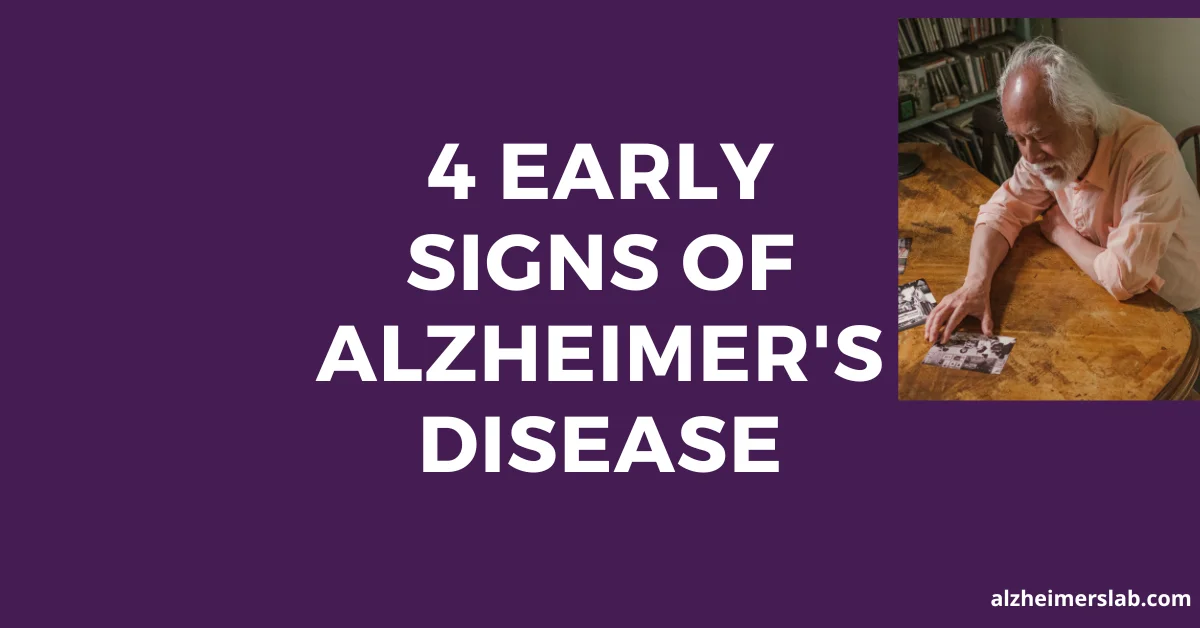4 Early Signs of Alzheimer’s Disease
Memory loss is a common concern as we age, but when it starts interfering with daily life, it might be more than just a normal part of getting older. Alzheimer’s disease is a progressive brain disorder that affects memory, thinking, and behavior. Recognizing the early signs is crucial for early intervention and better management. In this guide, I will discuss four key indicators that may signal the onset of Alzheimer’s in a loved one or yourself.
Here Are the 4 Early Signs of Alzheimer’s Disease
1. Forgetfulness in Daily Conversations

One of the earliest signs of Alzheimer’s is difficulty remembering recent conversations or events. Imagine having a chat with someone and, moments later, realizing they’ve forgotten what you discussed. Individuals in the early stages of Alzheimer’s may find themselves needing to write down simple details that were once easy to recall. They might rely on notes for everything, from grocery lists to essential tasks.
This forgetfulness goes beyond the occasional lapse; it becomes a consistent pattern, affecting day-to-day activities. If you or someone you know is grappling with an increased reliance on notes or forgetting recent conversations, it’s crucial to pay attention and seek professional advice.
2. Struggling to Find the Right Words

Another early sign is difficulty in expressing thoughts verbally. Picture having a conversation and suddenly finding it hard to retrieve the right words. This isn’t the occasional “tip-of-the-tongue” moment; it’s a persistent struggle to articulate thoughts. Those affected might sound like a child, using simpler language or repeating phrases. It’s not a matter of low intelligence; it’s a challenge rooted in the changes happening within the brain.
This difficulty in finding the right words can lead to frustration and a sense of isolation. Loved ones might notice a shift in communication style, and the affected individual may withdraw from social interactions due to this linguistic struggle. If someone you know exhibits these signs, it’s vital to consider the possibility of Alzheimer’s and consult with a healthcare professional.
3. Poor Judgment and Decision-Making
Alzheimer’s doesn’t just impact memory and language; it also affects a person’s ability to make sound judgments and decisions. Imagine someone making choices that seem illogical or even risky. This could manifest as financial mismanagement, falling for scams, or selling valuable assets at a fraction of their worth.
The individual might display poor judgment in situations where they once excelled, and their decision-making skills may deteriorate rapidly. It’s essential for family members and friends to be vigilant for signs of unusual or impractical choices, as this could indicate the onset of Alzheimer’s. Seeking professional guidance early on can help manage these challenges effectively.
4. Repetitive Basic Questions

As Alzheimer’s progresses, individuals may start asking the same basic questions repeatedly. This behavior is not mere forgetfulness but a manifestation of memory loss and cognitive decline. Loved ones may find themselves having to explain things repeatedly, as if the affected person is learning them for the first time.
This repetition can strain relationships, leading to frustration and irritation among family members and friends. Social circles may shrink as others become less patient with the constant need for clarification. Understanding that these repetitive questions are symptoms of a medical condition, rather than intentional behavior, is crucial for maintaining empathy and support.
Conclusion
Recognizing the early signs of Alzheimer’s is the first step towards providing the necessary support and seeking appropriate medical intervention. If you or someone you know is experiencing these symptoms, don’t hesitate to consult with a healthcare professional.
Early diagnosis allows for better management of the condition and can significantly improve the quality of life for both the affected individual and their loved ones. Remember, addressing the signs early on is a proactive measure that empowers everyone involved in the journey with Alzheimer’s.

